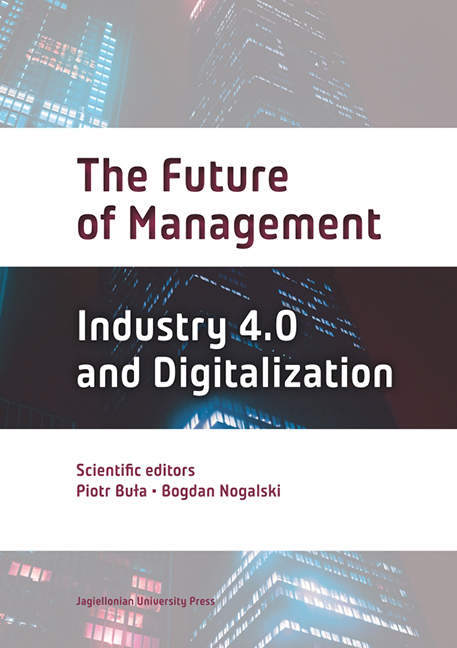Book contents
- Frontmatter
- Contents
- Preface
- Industry 4.0: Social Impacts and Operations Management Challenges
- Business Model Changes in the Presence of Challenges Brought by Industry 4.0
- Communication in Traditional and Network Organisation: Transformation
- Consequences of the Fourth Industrial Revolution in Social and Economic Development in the 21st Century
- Ideology, Trust, and Spirituality: A Framework for Management Control Research in the Era of Industry 4.0
- Renewable Energy through Industry 4.0 on the Example of Photovoltaic Development in Selected European Countries
- Employee Loyalty in the ICT Sector as a Challenge for Building Industry 4.0
- The Importance of Flexibility of Human, Tangible and Intangible Resources in Selected Production Entrepreneurships: Results of Empirical Research
- Challenges Posed for Universities by the Industry 4.0 Environment
- Big Data in Managing Marketing Communication
- Mathematical Risk Assessment Method in the Implementation of Logistic Processes
- Management and Digitisation
- Branding of Time as a New Direction in Tomorrow’s Management
- The Future of Branding
Business Model Changes in the Presence of Challenges Brought by Industry 4.0
Published online by Cambridge University Press: 16 November 2021
- Frontmatter
- Contents
- Preface
- Industry 4.0: Social Impacts and Operations Management Challenges
- Business Model Changes in the Presence of Challenges Brought by Industry 4.0
- Communication in Traditional and Network Organisation: Transformation
- Consequences of the Fourth Industrial Revolution in Social and Economic Development in the 21st Century
- Ideology, Trust, and Spirituality: A Framework for Management Control Research in the Era of Industry 4.0
- Renewable Energy through Industry 4.0 on the Example of Photovoltaic Development in Selected European Countries
- Employee Loyalty in the ICT Sector as a Challenge for Building Industry 4.0
- The Importance of Flexibility of Human, Tangible and Intangible Resources in Selected Production Entrepreneurships: Results of Empirical Research
- Challenges Posed for Universities by the Industry 4.0 Environment
- Big Data in Managing Marketing Communication
- Mathematical Risk Assessment Method in the Implementation of Logistic Processes
- Management and Digitisation
- Branding of Time as a New Direction in Tomorrow’s Management
- The Future of Branding
Summary
Abstract
The business model is a new research area, becoming more and more clear on the research map of strategic management sciences. Global competition, the requirements of sustainable development, the construction of an innovative economy and Industry 4.0 induce the need for creating new or changing current business models. The business models of companies applying various types of innovations constituted the main focus of the research. These companies used digitisation for creating value for clients as well as maintaining (capturing) it, and gaining competitive edge. The purpose of the paper is the presentation of modern business models using features and elements of Industry 4.0. The work underlines their attributes as well as directions of changes of current business models adapting to effective functioning under the conditions of the fourth industrial revolution. It identifies the antecedents of creating and changing business models in the aspect of implementing Industry 4.0. The paper presents the role of innovation and digital technologies as elements in creating value through business models. It also presents case studies, i.e. undertakings using the elements of Industry 4.0 to create their own business models based on renewable energy.
Keywords: Industry 4.0, digital economy, business models, photovoltaics, passive building
Introduction
The dynamics of the surroundings, especially the increasing competition and the progressing globalisation, pose new challenges before organisations within their strategic and operational management. This leads to the search for the creation and application of even more complex systems, methods and management instruments. At the moment, business models deciding about competitiveness potential and effectiveness of a given organisation are one of the major management instruments, representing a generator of value for a client and growth of goodwill. Business models capture the concepts of creating value based on various sources; this may be resources, processes or competences, and now numerous innovations play a significant role in creating value and achieving competitive edge. The creation of new business models or a change of the existing ones is affected both by the internal conditions of a given organisation and external factors resulting from the surrounding dynamics. One of such substantial external factors affecting the concept of new business models or adaptive changes in the functioning business models, is the fourth industrial revolution, or the so-called Industry 4.0.
- Type
- Chapter
- Information
- The Future of ManagementVolume Two: Industry 4.0 and Digitalization, pp. 22 - 41Publisher: Jagiellonian University PressPrint publication year: 2022

